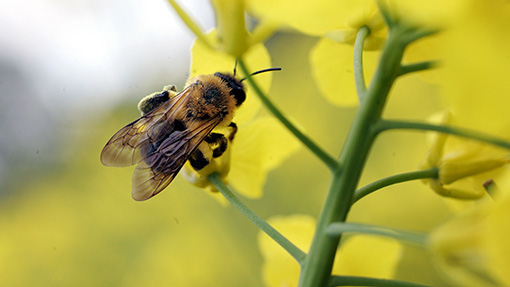Boost bee health in the hive through mite control

Bayer CropScience is hoping to boost the health of honeybees by 2018 with a product aimed at controlling the bee’s worst enemy.
Bee health was highlighted in the banning of neonicotinoid seed treatment in oilseed rape within the European Union, as the pesticide was linked to bee deaths.
However, many scientists believe varroa mites are a bigger threat to bees as they carry a number of bee viruses and diseases, and the German agrochemical group is working on a solution.
It is developing a co-called varroa gate, which is a device impregnated with insecticides. It forces bees entering a hive to pass through a narrow aperture that will brush the insecticide across their bodies.
The group’s bee health expert, Peter Trodtfeld, is looking at a system whereby the insecticide could be changed every year to prevent any mite resistance building up.
“We have had very good results from observation trials, where we have seen 96-99% control of the varroa mite,” he tells Farmers Weekly.
He hopes to have registration for the new product by 2017 and to launch it in 2018 using three different insecticides.
The idea is to put the varroa gate in a hive for four months between August and November, when honey collection by the bees is largely over and the varroa mites are breeding.
Three different established insecticides are being looked at – flumethrin, coumaphos and amitraz – to control mites and help bees survive the winter.
“The best thing is that the system protects winter bees from varroa which can lead to colonies collapsing,” he says.
The group already markets impregnated strips that can be placed in a hive under the trade name Bayvarol, which also contains flumethrin. The gates, however, are aimed at targeting the mites more accurately.
As nearly 10% of world food production comes from crops that need to be pollinated by bees such as edible oilseeds, fruit and vegetable, the issue of bee health is vital.
Mr Trodtfeld is working at the bee centre at Bayer CropScience’s headquarters in Monheim, just south of Dusseldorf, which has been the focus of the group’s work on bee health for a number of years.
